- Home
- James Grady
Shadow of the Condor Page 2
Shadow of the Condor Read online
Page 2
The general followed the trim figure up the stairs to the second floor, barely resisting the strong temptation to smash his escort in the kidneys. They walked down the thick-carpeted ball past a number of shut rooms, stopping before a set of beautifully stained wooden double doors. The tall man knocked softly, then escorted the general inside.
A kindly-looking old man rose from his chair and walked around his massive desk to greet the general. The old man gave the impression of delicate spryness. Strangers who pass him on the street are always reminded of the kindly old uncle whom they never had. The old man7s eyes twinkled as he extended his hand. "Ah, General," he said fondly, "how are you, old friend? You're looking well. Come, let's sit down in the armchairs. My tired old body could use something soft."
The general beamed as he grasped the old man7s hand. He wanted to crush the thin fingers in his own powerful grasp, but he contented himself with a firm squeeze. "Fine, fine, Phillip. You're looking well, too, and about as old as some of the young pups I order around."
"That's most kind of you, General," said the old man, "most kind."
The tall man crossed to a table on the far wall. When he returned, he carried a tray with a cup for each man and a pot of coffee. While the general and the old man sat smiling in silence, the secretary filled each cup. He carefully added a level spoonful of sugar to the old man's portion. After a glance at his superior to see if everything was in order, the tall man left the room, shutting the doors behind him.
"And how is your family?" inquired the old man as he raised his cup to his lips.
The general shrugged and replied, "About the same as always, fine. How is yours?" The general sipped the coffee. The hot liquid burned his lips, but he gave no sign of his discomfort.
"Fine, fine. My wife just got over the flu."
"Really? How awful." The general already knew this from the FBI surveillance reports he had purloined. He didn't know that the old man knew the general was receiving this information.
"Yes," continued the old man, "awful thing, that flu. She went around all day throwing up and making a mess of things."
The old man's crass description startled the general slightly. Such talk was certainly out of character. And had there been an edge to his voice?. "Oh," replied the general, whose carefully -prepared repertoire of appropriate conversational gambits contained no suitable line for this instance.
"Yes, awful. Oh, well, she’s over it now."
"Yes, I suppose she is. Over it, I mean."
They sat in silence for almost three minutes, slowly sipping coffee. Sweat formed on the general's brow from the hot coffee steaming in his face and from his nerves. The general glanced down at his cup. He hadn't meant to finish so soon. The old man still hadn't asked him anything. Very carefully the general raised his eyes, swallowed and meekly said, "I suppose you're wondering why I'm here."
Bad start, thought the general, bad start. But he didn't have time to dwell on his error before the old man replied.
"The question has crossed my mind."
Go, thought the general, do it! "Well, it’s nothing, really. Just a small matter I thought you might be able to help me with. It's nothing I want to bring up formally through the Liaison Board or waste the time of any of the committees with, but it is something that. is rather important in an offbeat kind-of way, so I naturally thought of you, I mean, you are staff director for L Group and all."
The old man nodded slightly while the general regained his breath. Nothing, thought the general, the bastard won't say anything.
"Well," continued the general offhandedly, "I won't bother you with details because if you decide to have a whack at it, you might as well get them from here." The general reached into his briefcase and extracted a thin file folder. Fortunately for them, his men had finished typing the final report less than five minutes before he bad left for his appointment. "Let me just put you in the big picture. As you know, my branch of Air Force Intelligence maintains a low profile. The director sometimes doesn't even bother much with my things; he just leaves them up to me. Within reason, of course.
"About two weeks ago, on the twelfth, to be exact, one of my best men in Europe, a Captain Donald Parkins, sent a message to-his case officer and said he was going to check out a reference to our Minuteman missiles he overheard in a bar. Unfortunately Parkins didn't relay the reference to his CO. He only said it had something to do with the missile sites. Parkins also didn't say exactly where he heard it or from whom. Since he was operating out of London at the time, we assume he heard it there or at least in that vicinity.
"On the thirteenth the CO tried to find Parkins. No luck.
The CO assumed Parkins was following up and would be in touch. After three days the CO got excited, posted Parkins missing, checked his apartment and informed us in Washington. I was - most upset. We heard nothing more from or of Parkins.
"Then early yesterday morning, or rather, late the night before last, we heard from Parkins again. Before I go on, can I have some more coffee? And could you tell me what you know about our Minuteman missile system?"
The old man graciously nodded toward the coffeepot and replied, "Oh, a fair amount in general, enough specifics to talk about the system intelligently. Why don't you give me the specific pertinent to this thing?"
The general hadn't been prepared to resume the conversation so soon. He almost spilled the coffee as he set the pot down. The son of a bitch. "Well," he said amiably, "basically it works like this: The missiles are mainly scattered through Montana, the two Dakotas and a few classified areas in underground, unmanned silos. There are also underground launch and control facilities, and each missile group is overseen by a large surface air base. Each missile silo is surrounded by a chain-link, barbed-wire-topped fence. Everything of any importance is underground, sealed behind concrete doors. If the missile is launched, we have to use explosives to open those doors. On the surface there are some ventilator shafts, some closed-circuit TV units, light units, but basically there's not much aboveground inside that fence. At night the whole area is lit with spotlights. The farmers in the area used to complain that it was spooky to drive around their land at night and come upon this brightly lit section.
Security for those birds is tight, and I mean tight. Besides the TV cameras, there are seismograph units spread in the ground so the security crews at the launch centers can tell when anything walks near or inside the fence. We have a bell of a time training the seismograph monitors to tell the difference between a coyote and a man, but ' after awhile they get damn good. Damn good. Each site also gets visited on a non-routine basis by a motor patrol, and there are armed security crews with helicopters and security substations on a twenty-four-hour alert standby basis less than twenty-five minutes from each missile. Besides all that, there are a couple of cute things we can do to keep a saboteur busy while the copters are getting to him. Get the picture?"
"Yes," replied the old man with a slight frown, "although I'm not sure how it all ties in with your missing agent."
The general blushed slightly as he said, "Neither am I, but a little over thirty hours ago he turned up in the middle of a missile site in northern Montana. Dead."
The old man raised his eyebrows, but made no comment.
"The first we knew of him was when he hit the fence. That triggered all sorts of alarms at the launch control, and they alerted Malmstrom Air Forte Base in Great Falls, the only decent-sized city anywhere near the missile. Malmstrom happened to have a couple of security crews logging night flight patrol time just south of the missile site. The Air Force base itself is almost ninety miles from the site. While the copters were scrambling to the site, the security crews watched our boy on the closed-circuit TV. They figured he was a drunk or a high school kid on a practical joke. He started beating on one of the ventilators, then fell down. The transmission from the site wasn't any too good, so they couldn't see what was wrong. Their cameras don't pan the surroundings either. They watched him lie still until t
he copters arrived.
"Someone had shot him, twice, probably with a hunting rifle. The copters found no trace of anybody or anything in the area, and they searched a ten-mile radius. Nothing unusual turned up, no farm lights on when they shouldn't have been, no moving vehicles. The team commander searched the body right away, a lucky thing or the local authorities might have been called in.
"Parkins had his passport taped to his thigh, probably to keep it from being found in a cursory search and to keep it close. The squad leader relayed the name it was false, of course-and the passport number back to Malmstrom and the security office there ran a computer check to the Pentagon, State and the FBI. All other passports we issue our men, genuine or not, have a certain code ,number so that when an inquiry is made on that passport, our headquarters is informed without letting the inquirer know. The officer at our alert desk found out who was making the request and why. Then he got through to the Malmstrom security commander and told him to put a lid on it until further notice. I got the call a few minutes later and flew out myself. I had security clean up the missile site before any locals could see it.
"Besides his passport, Parkins wasn't carrying a thing which helps us. Some change-Canadian, English and American-a comb, handkerchief, plus the usual pocket things a man has. He was dressed in casual street wear. From his general condition, all we could deduce was that be had recently exercised quite vigorously, -sweat stains and that kind of thing. From the scratches and abrasions on his body, we deduced that he had been running."
"Did you make any attempt to backtrack him?"
"We made the attempt. All we know is that he bit the fence on the north side. Hell, none of my men are Kit Carson types. And we couldn't make a big deal of the search or the locals would know. That wouldn't do anybody any good."
The old man smiled. "Well, that certainly is interesting. Exactly what is it you want me to do, old friend7"
You son of a bitch, thought the general. You're going to make me ask for it. "Well, as you can see, it's quite a mess. Apart from everything else, one of my men is dead. A goddamn good man too, a hell of a guy. Loved him like my own son. It gravels me to think that the guy who killed him is still out there running around free. But we have to be professional about this.
"The thing is, see, it is kind of out of my jurisdiction. I mean, sure, it was my guy. But he was killed under Air Force Security's shop. They don't want to touch it, and I can't say I blame them because it's not really their thing either. None of us are too keen on running a military operation stateside. The Army is still burning from when they got caught spying stateside on civilians. If we got caught with our pants down, it could be awfully bad PR for the Force. Awfully bad.
"Besides, we don't have the resources. We need help, even though I'm sure the whole thing is really very simple and easy to explain. But the thing cuts across so many jurisdictions. It's a natural for L Group to work on. But I really don't think it's worth taking up at a full meeting of IC or Forty. So I thought if I gave the stuff to you, you and your staff could take it over from us. I mean, you could check it with Forty and then go, with their suggestion. Of course, I’ll give you all the backup I can.
The coffee was cold, but drinking it gave the general something to do, an excuse for not meeting the old man's twinkling eyes.
The two men sat quietly for a long time. The old man watched the general. The general watched nothing in particular, occasionally taking small sips of nauseatingly cold coffee, hoping it would last, hoping he was successfully filling the awful void, hoping the old man would say the right thing or at least say nothing too dangerously wrong.
"Well," said the old man at last, "well. You do have a problem." The general winced, but said nothing. The old man continued.
"I really can't make heads or tails of the whole thing. It's a puzzle. I'm not even sure what to do or what I can do. Of course, the Staff Liaison Board and Forty will have a lot to say about that, for, as you know, I act only as their agent."
The general nodded and resigned himself to hell.
"But I'll tell you what I'll do," said the old man lightly. "I'll look over this file, maybe send a few questions over to your shop. I'll see if I can come up with any ideas. If I do, I'll check them out with Forty, informally, then get back to you. All right?"
The general wasn't sure if he was grateful, but he was relieved. After putting him through the hoops, the old man had at least dangled a bone in front of him. "Thank you, Phillip, thank you. I knew I could count on you."
The old man rose and escorted the general to the door. He walked spryly and his voice was light when he said, "You must remember me to your wife. Lovely woman, lovely woman."
"Of course, of course," replied the general, "and we should get together soon, informally, without all the mess of work with us."
"How true," said the old man as he opened the door. "How true. Do come again, General. And don't worry, I'll get back to you on this."
The general left the town house much more eagerly than he had come. He convinced himself everything was fixed, an easy task, since the general always accepted helpful interpretations. He had dumped -on the old man and gotten rid of a problem all at the same time, he thought. Not that the whole mess had been any of his problem in the first place or that the old man wasn't the one who really should handle the damn thing. The old bastard should thank him for all the help he had given him this far. Let him take the heat, thought the general, I have nothing to worry about.
Back in the red town house the old man sat smiling while the general strode gleefully toward his waiting car.
As the general slammed his car door, the old man began to laugh, lowly, slowly, sardonically. He laughed for a long time, long after the unmarked Air Force car slid out of its parking space carrying the general back to the Pentagon, where he would spend the rest of the day celebrating. The old man stopped laughing before the car reached the express highway encircling Washington and sat quietly while the car purred toward the Pentagon.
But his thoughts were deep. He reached for the thin manila file the general had left Ten minutes and two thorough-readings later he closed the file and leaned back in his chair. He shut his eyes to concentrate. This time he thought for almost half an hour. When he opened, his eyes, he picked up a note pad, reopened the file and began to write. Five minutes later he buzzed for his secretary.
The tall man entered the room quietly. He made little noise as he shut the door. He spoke softly, respectfully, sir?
"No more need to inquire about that mess we heard the Air Force had, Carl," the old man said. "The good general just gave me everything.
"I think we have something here. Something we can use to keep our hand in. It couldn't have come at a better time either. Forty is reviewing our budget in a month, and a little flurry of activity always pleases OMB. This should do nicely.
"I've made a list of information I want pulled from the pool. Check FBI first, then CIA, NSA, the service group, Treasury, Justice and Secret Service. Tell them we want it immediately. I'll be satisfied if we have the bureau and the agency [FBI and CIA] data by tomorrow and the rest the day after.
"We're starting an operation, stateside and European. We probably won't need a large number of personnel, but I want backup teams ready. We will mainly use agency people, although I imagine the bureau will insist on coming in when we work stateside. I've noted some suggestions. Call the agency's M&S [Directorate of Management and Services] and tell them we will be drawing personnel, equipment and funds.
"Today as soon as possible, I want to see Dr. Lofts and Kevin Powell-from the agency. Powell just got back from Turkey. He should be at Langley [the CIA Virginia headquarters complex]. You know where Lofts is. That should keep you busy until lunch."
"Yes, sir," Carl replied softly. He smiled slightly as he took the note pad from the old man's wrinkled hand. Carl has 'no note pads. He doesn't use thern because he doesn't need notes. Carl receives his very comfortable salary mainly because he has
a 90 percent retention rate: For all "practical purposes" Carl has total recall. Carl also draws a high salary because his remarkable mind is void of almost all normal feelings except narrow and minimal loyalty, self-preservation, a slight desire for self-gratification, a trace of self-serving sadism, vindictiveness and snobbish pride.
"Is there anything else, sir?" asked Carl quietly.
"Yes," said the old man, "could you bring me some more coffee?"
"Of course sir," replied Carl. The tall secretary turned and left the room as silently as he had come. The old man relaxed in his chair and once more began to laugh.
World War II spawned a massive new phenomenon in American politics, a phenomenon which has since grown into an integral part of the American political scene. The experiences of World War II and the new perceptions adopted largely as a result of that war created the American intelligence community.
Before World War II the closest thing America had to an intelligence or security agency was the FBI. Thirty-five years later the American intelligence community consists of ten major agencies with more than 150,000 employees and an aggregate annual budget of just under $6.3 billion.
The best-known and most important member of the community is the Central Intelligence Agency, the department created by the National Security Act of 1947 to coordinate all of America's intelligence activity for the President. The CIA director runs his own agency and serves as the director of Central Intelligence (DCI), the titular head of the entire intelligence community. Officially the DCI overseees the Defense Intelligence Agency, the armed services' intelligence branches, the National Security Agency, the State-Department's Bureau of Intelligence and Research, the. Internal Security Division of the FBI, the Atomic Energy Commission's Division of Intelligence and the Treasury Department's small intelligence unit. In reality, the DCI's fiefdom consists of fiercely independent bureaucratic entities resisting outside supervision. As Admiral Rufus Taylor, former head of Naval Intelligence and a former CIA deputy director,, noted, America's intelligence community resembles "a tribal federation."

 The Short Takes
The Short Takes Montana Noir
Montana Noir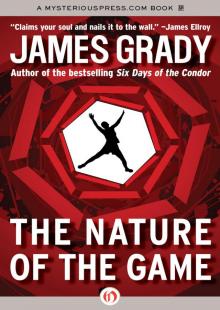 Nature of the Game
Nature of the Game Condor in the Stacks
Condor in the Stacks This Given Sky
This Given Sky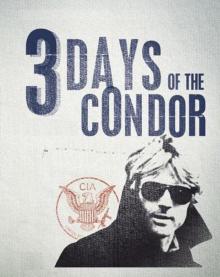 Three Days of the Condor
Three Days of the Condor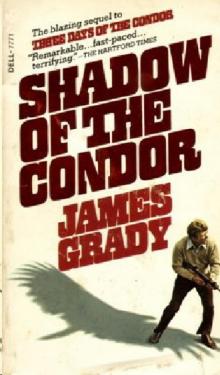 Shadow of the Condor
Shadow of the Condor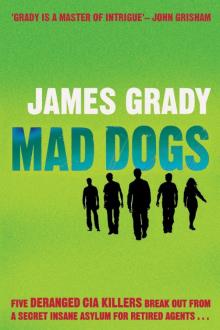 Mad Dogs
Mad Dogs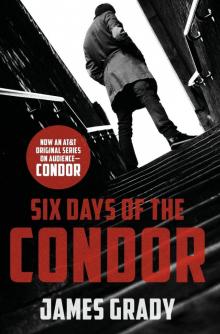 Six Days of the Condor
Six Days of the Condor Next Day of the Condor
Next Day of the Condor